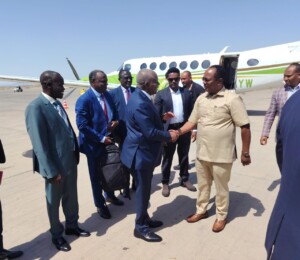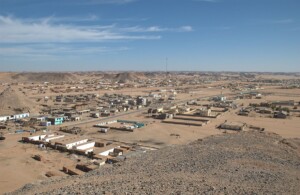Resistance Committees threaten ‘return to the streets’ if Sudan lifts commodity subsidies
The three-day National Economic Conference that concluded on Monday in the Sudanese capital Khartoum, has recommended lifting commodity subsidies and replacing them with direct cash, amid strong opposition from youth and members of the Resistance Committees who threaten to “return to the streets”.
 Khartoum National Economic Conference (Social media)
Khartoum National Economic Conference (Social media)
The three-day National Economic Conference that concluded on Monday in the Sudanese capital Khartoum, has recommended lifting commodity subsidies and replacing them with direct cash, amid strong opposition from youth and members of the Resistance Committees who threaten to “return to the streets”.
Reading the recommendations of the conference at the conclusion of its work in Khartoum on Monday, economic advisor to Prime Minister Abdallah Hamdok, Adam Hereika, said that the commodity subsidies represent a burden on the budget and the balance of trade, and that the rural population does not benefit from it, especially for electricity and cooking gas, which requires transferring it to direct cash support.
Anas Mohamed, the representative of the Resistance Committees active in the neighbourhoods and villages in Sudan, declared that the committees reject the recommendation to lift subsidies. Members of the Resistance Committees at the conference heckled “I do not agree!”.
Prime Minister Abdallah Hamdok announced the transformation of a Preparatory Committee for the Economic Conference, into mechanism to follow up the implementation of the conference outcomes and recommendations.
‘An excellent democratic exercise’
Hamdok described the conference which included members of political parties, rebel movements, Resistance Committees, civil society organisations, and professional associations, as “an excellent democratic exercise”.
He stressed that the conference provided an opportunity for dialogue, consultation, and cross-pollination of ideas regarding the country’s future economy.
The Economic Committee of the Forces for Freedom and Change said that what is required at this stage is not to reduce or float the exchange rate of the Sudanese Pound, but rather to strengthen its exchange rate by providing hard currencies to the banks and thus providing the basic needs of the country.
To achieve this, the committee recommended establishing a stock exchange for gold exports and agricultural and livestock exports, in addition to government control over exports of gold and minerals and building a reserve of gold with the Central Bank of Sudan (CBoS) to benefit from it in obtaining external/foreign credits.
The committee also called for the return of public shareholding companies that work in the fields of exports, namely the Gum Arabic Company, the Oil Seeds Company, the Cottons Company, and the Livestock and Meat Company, and called for preventing telecommunications companies and other institutions from purchasing hard currencies from the parallel market. He also sais the government should be prefented from buying dollars from the parallel market, and that any action or decision that pays any contractor with the government to buy dollars from the local market should be stopped.
Radio Dabanga’s editorial independence means that we can continue to provide factual updates about political developments to Sudanese and international actors, educate people about how to avoid outbreaks of infectious diseases, and provide a window to the world for those in all corners of Sudan. Support Radio Dabanga for as little as €2.50, the equivalent of a cup of coffee.












 and then
and then